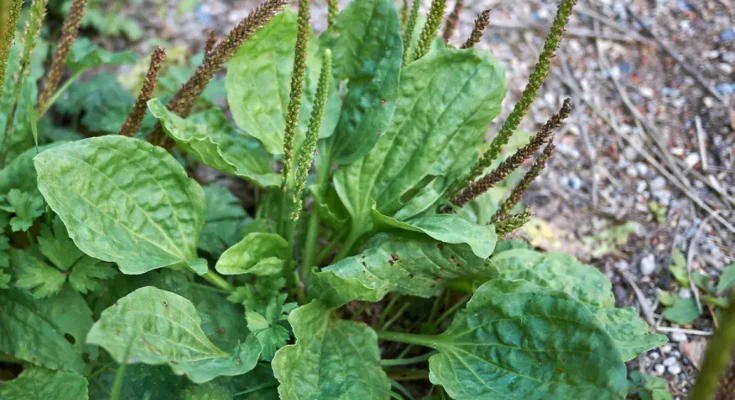Plantain (Plantago spp.), a common yet remarkable medicinal plant, has been used for centuries in traditional medicine due to its impressive therapeutic properties. Found growing spontaneously in gardens, along roadsides, and in meadows, plantain is not only a resilient herb but also a powerhouse of health benefits.
Properties of Plantain
Plantain is packed with nutrients and bioactive compounds that contribute to its medicinal value. It is rich in vitamins A, C, and K, as well as minerals like calcium, magnesium, and potassium. The plant is also a good source of fiber and contains bioactive compounds such as flavonoids, tannins, and iridoid glycosides, which have anti-inflammatory, antimicrobial, and antioxidant properties.
Plantain leaves are particularly valued for their high mucilage content, a gel-like substance that provides a soothing effect on the skin and mucous membranes. The seeds of plantain, often referred to as psyllium, are widely used as a natural remedy for digestive health due to their high fiber content.
Benefits of Plantain
- Wound Healing: Plantain is renowned for its ability to promote wound healing. Its anti-inflammatory and antimicrobial properties help reduce swelling, prevent infections, and accelerate tissue repair. Crushed plantain leaves can be applied directly to cuts, scrapes, or insect bites for relief.
- Respiratory Health: Plantain leaves are used to alleviate respiratory issues such as coughs, bronchitis, and asthma. The mucilage in the leaves soothes irritated mucous membranes, while its expectorant properties help clear mucus from the airways.
- Digestive Support: Psyllium, derived from plantain seeds, is a popular remedy for constipation and other digestive problems. The fiber absorbs water in the intestines, easing bowel movements and promoting gut health.
- Skin Care: The plant’s soothing and anti-inflammatory properties make it effective in treating skin conditions like eczema, acne, and sunburn. Its ability to draw out toxins makes it a natural remedy for boils and abscesses.
- Anti-inflammatory Effects: The iridoid glycosides in plantain have potent anti-inflammatory effects, making it beneficial for conditions such as arthritis and other inflammatory disorders.
- Immune Support: Rich in vitamin C and antioxidants, plantain helps boost the immune system and protect the body from free radical damage.
- Urinary Health: Plantain has diuretic properties that support kidney and bladder health. It can help flush out toxins and alleviate urinary tract infections.
- Blood Sugar Regulation: Preliminary studies suggest that plantain may help regulate blood sugar levels, making it potentially beneficial for managing diabetes.
How to Use Plantain
Plantain can be used in various forms, including fresh leaves, teas, tinctures, and salves. Fresh leaves can be crushed and applied topically to wounds, while dried leaves are often brewed into tea for respiratory and digestive issues. Psyllium seeds are available in powdered or husk form and are commonly used as a fiber supplement.
Precautions
While plantain is generally safe, excessive consumption of psyllium may cause digestive discomfort. Always consult a healthcare professional before using plantain, especially if pregnant, nursing, or taking medications.
Plantain exemplifies how nature provides simple yet effective remedies for a wide range of health concerns. Accessible and versatile, it remains a treasured medicinal plant for traditional and modern medicine alike.



